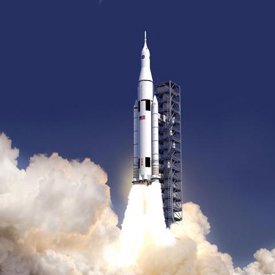SLS and the Sense of Congress
In one of its final acts the 1112th Congress passed the Space Exploration Sustainability Act, a bill originally introduced on December 4th by newly re-elected Senator Bill Nelson of Florida, and retiring Kay Bailey Hutchison of Texas. The primary purpose of the legislation was to secure space launch liability indemnification for another year, (the House wanted two years) and to enable NASA to continue purchasing space transportation from Russia through 2020, which meant it had to receive an ongoing exemption from INSKA, the Iran, North Korea, and Syria Non Proliferation Act.
In addition to these two house keeping measures, the bill also included a “sense of Congress” that in the coming year NASA should proceed with both the Space Launch System and the Commercial Crew Program and refrain from deleting funds from one to pay for the other. Given Hutchison’s historical antipathy towards Commercial Crew when juxtaposed with SLS, it is a fair bet that the concern lay more with the latter.
Although a major change in either program seems unlikely for 2013, the ground could shift in 2014, particularly if both SpaceX and Boeing make significant progress in pursuing their respective Commercial Crew systems over the next 12 months. At whatever point in time both the public and the Congress perceive that the U.S. is well on the way to regaining crew launch capability from U.S. soil, the perspective that the nation has lost something it once possessed, will begin to shift somewhat and depending on the status of the budget, some in Congress may be sorely tempted to consider just the sort of exchange the current bill seeks to dissuade.
The real pressure is likely to begin however, at just about moment the strap-on boosters successfully separate from the first Falcon Heavy launch. At that point, what is now purely theoretical, a low cost heavy lift booster, becomes a reality, and an actual basis for comparison against the Senate’s own launch system, which is quite likely to be still just theoretical itself. That is when we will really learn the “sense” of Congress.



You seem to have faith in engine exploding spaceX over Nasa. SpaceX employees all seem overworked and frightened. Shortcuts are never good. And until Falcon can lift anywhere close to SLS, you can’t compare. Nevermind the quality of the vehicle. There’s a reason anti-SLS feeling is down to but a handful of people.
We seem to have faith in engine-exploding-but-still-delivers-to-ISS SpaceX over shuttle-exploding, shuttle-disintegrating, astronaut-killing Nasa. When it comes to vulnerability to cheap shots, Nasa beats all competition. In spite of its phenomenal successes, it is not above reproach.
SLS has nothing to do with Nasa, it is a public works program created by politicians to create corruption opportunities for politicians.
Donald, Should I point out the many very cool videos there are on YouTube of entire rockets exploding? Atlas 2s and what not? Or mention Orbital’s failed fairing separations? So far, SpaceX’s overworked and frightened employees seem to have put quite a twist in your panties.
Believe me, anti-SLS feeling is far from being shared by just “a handful of people”. I imagine everyone at NASA who has a project they’d like funded is, at heart, anti-SLS. Rightly so due to the unbelievable amount of wasted money that is being spent on something that no one really needs.
When Falcon Heavy flies, SLS will be doomed, and we can get back to really exciting projects like a lander or sample return missions for Europa or Enceladus.